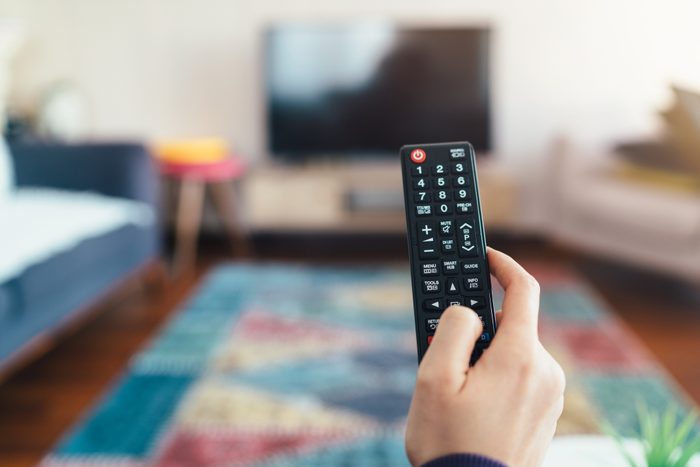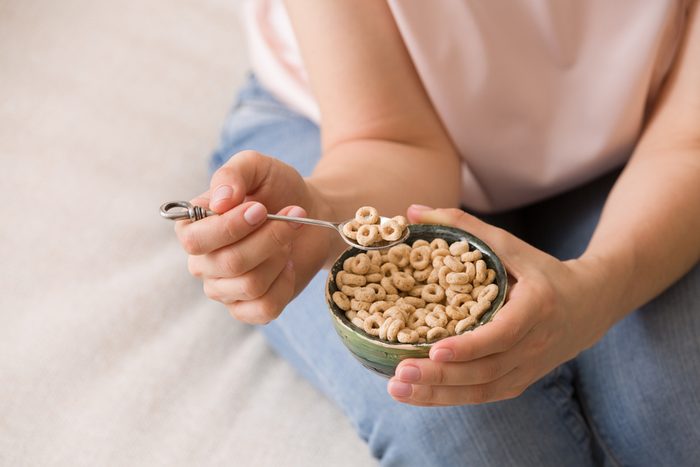
Overeating, worshipping the sun, spending beyond your means—we all know these habits fall squarely into the bad-for-you category. But just how bad are they? Turns out, they can wreak plenty of havoc with your overall health. Keep reading to see how you can break 10 bad health habits.

Snacking when you’re not hungry
Losing touch with your body’s natural hunger and satisfaction signals can lead to chronic overeating and unhealthy extra pounds—which increases your risk for diabetes, heart disease, and other serious conditions. And if it’s junk food you’re snacking on—or even so-called “healthy” snacks that are secretly bad for you—you’re also flooding your body with unhealthy ingredients. (Learn the secrets that keep these countries the heart-healthiest in the world.)
Snacking when you’re not hungry “really does miss the concept of what it means to truly fuel your body and instead highlights a deeper issue such as boredom, stress, depression, or anxiety,” says Kristin Kirkpatrick, RDN, a registered dietitian nutritionist and owner of KAK Consulting in Denver. “When I see this habit in my patients, I try to use it as a learning experience to identify the ‘why’ and to start healing the hidden reasons why food is becoming a remedy. I tell them to eat until they are no longer hungry, not until they are full. Finding the balance here can truly help tap into intuitive eating.”
By paying attention to your hunger signals and switching to healthy snacks, you can boost nutrition, control cravings, and avoid energy slumps. Your weight will fall to a healthier level, and you’ll replace unhealthy trans and saturated fat, sugar, refined carbohydrates, and extra sodium with more nutritious fare.
How to fix it: Eat because you’re hungry—not because you’re stressed, bored, angry, sad, or any of these other feelings you don’t realize you mistake for hunger. And finish eating when you feel just a little bit full, not stuffed.
“When you want to eat, stop and ask yourself what you’re actually feeling,” suggests Kirkpatrick. “If hunger isn’t it, then come up with a 15-minute distraction that takes you away from the kitchen, pantry, or food source.” This trick works especially well in the evening, she says. “It can be uncomfortable to go to sleep hungry, but nighttime isn’t when we need to be eating,” she says. “Piling on the calories at this hour can derail even the best diets.”
Other tricks to try: Avoid keeping unhealthy food in your home, or at least make sure you have healthier fare like fresh fruit, veggies, and nuts—or any of these 30 healthy snacks that can help you lose weight—on hand. Think low-fat versus fatty treats; whole-grain versus unhealthy carbs. And when you eat those healthy snacks, eat them as if they were a meal: on a plate, accompanied by a glass of water, and consumed while sitting at the table.

Spending too much time on the couch watching TV
A sedentary lifestyle has long been linked to poor health. The less physical activity you get, the greater your odds of being overweight and developing type 2 diabetes. A growing body of research suggests it may also affect personality. In the largest study of its kind, published in 2018 in Journal of Research in Personality, researchers looked at data from three studies and found a link between a lack of exercise and a decline in character traits such as conscientiousness that can persist for up to 20 years.
If television is replacing time you’d otherwise be spending engaged in a favorite hobby, visiting with friends, or exercising your mind, you may also be speeding up memory loss. You’d be surprised at how many ways exercise and movement can radically improve your health and well-being. By committing to a healthy TV/activity balance, you can burn more calories, become more fit, and reduce your odds for related health problems quickly. You’ll have a fitter body and more time for sleep, plus more energy, a better mood, sharper mind, and more social connections.
How to fix it: Try to keep your TV time to a max of two hours a day, and make sure you’re getting at least 30 minutes of exercise. Get the best of both worlds by doing some light workouts, like walking in place or doing sit-ups, while you’re watching. Even household chores, like vacuuming or doing laundry, during the commercials can add up to 20 minutes’ worth of calorie-burning time. And avoid snacking in front of the TV. That sort of distracted eating makes it far too easy to eat hundreds of calories’ worth of chips and barely realize it.

Overspending your way into debt
Money worries can have serious health consequences. In a study of 640 middle-age adults, published in 2016 in the journal Psychosomatic Medicine, researchers found that participants going through financial stress had greater levels of inflammation—and not so much because of increased negative emotions, but because of decreased positive ones.
Regaining a hold on your finances takes time, can be hard on your ego and your lifestyle, and requires you to be constantly vigilant. But “recognizing that you can make change in your life is important,” says Nicole Bereolos, PhD, a clinical psychologist in private practice in Dallas. The results are worth whatever sacrifices you have to make.
How to fix it: There are many things you can do to gain control over your finances. “Taking ownership of your habits in the first step,” says Bereolos. “With financial stress, it’s important to get an accurate sense of where your money goes. Keeping track of that soda you purchase three times per week, the money you give your children for lunch, etc., will all help you to figure out a healthier budget. We spend more money than we realize sometimes.”
Educate yourself on the basic rules and methods of personal finance—including credit cards, mortgages, budgeting, and investing. Pay at least the minimum each month on your bills, to stay ahead of your expenses and prioritize paying more to the credit card with the highest interest rate. Automatic bill pay can ensure you’re never hit with late fees. And be sure some of your paycheck gets automatically transferred to your savings account; set up recurrent monthly transfers via your employer’s payroll department or your own online banking.
“Make it a family affair,” says Bereolos. “Everyone in the household can [participate] in making better financial decisions. Talking to a financial planner can help give you a different perspective about what’s going on. By calling the agency to which you owe money and explaining your situation, may help you get more manageable payment arrangements.”

Eating too much fast food
A steady diet of double cheeseburgers and fries washed down with an oversize soda or milkshake can obviously lead to a growing waistline, but it can also result in assorted obesity-related health problems like heart disease and type 2 diabetes. That’s not all: “Some studies show that fast food can reduce the effectiveness of the immune system and lead to poor mental health,” says Kirkpatrick.
The health benefits of making the switch to healthy food will be almost immediate and will have substantial lasting benefits.
How to fix it: That’s not to say it will be easy, though. Fast food is super-convenient, inexpensive, and—thanks to all that fat, salt, and sugar—undeniably tasty. “Depending on how aggressive the habit is, this can be hard to nix, but you can start by altering what you order,” says Kirkpatrick. For instance, replace the soda with a water or the fries with a salad, and “opt for more whole grains and plants.” (You can also try one of these 10 healthy fast food options at the most popular fast food restaurants.)
“Then reduce the number of days you go by half,” says Kirkpatrick, and make home-cooked meals instead. If inconvenience is a factor don’t overlook healthier prepared meals from your local grocery store or sandwich shop.

Getting sunburned a few times every summer
A study of more than 31,000 adults in the U.S., published in 2018 in JAMA Dermatology, suggests that many of us still haven’t gotten the message about sunburns. Nearly 5 million people are treated for skin cancer in the U.S. each year and part of that is because we aren’t vigilant and consistent with sun protection. The researchers found that physically active people, and those who use sunless tanners or sunscreen for tanning purposes are especially prone to sunburns. Even just one blistering burn doubles your risk of developing melanoma later in life.
Bottom line: If you love sunbathing or make an effort to maintain a golden-bronze tan, you’ve unwittingly contributed to the aging of your skin. Sunbathing destroys the elastic fibers that keep skin looking firm and smooth, leading to earlier wrinkles, blotches, freckles, and discolorations. More important, sunburns contribute significantly to cancers of the skin. If you’ve included trips to the tanning salon, that’s even worse. Despite what ads suggest, there’s no such thing as a “safe” tan. Using a tanning bed actually raises your risk for skin cancer and wrinkles, according to the American Academy of Dermatology.
How to fix it: Always, always, always wear a high-SPF sunscreen when you’re outdoors. Sticking to the shade and wearing a hat, sunglasses, long sleeves, and pants during peak sunburn hours can also help keep your skin safe. Schedule an annual “mole check” by a dermatologist; the doctor will inspect your skin for any unusual changes. And keep your eyes on your skin yourself. Anything new that doesn’t look right to you should be checked by a doctor. Finally, if you can’t live without the bronzed look, use a self-tanner.

Behavior that leaves you angry, worried, or stressed all of the time
More than three-quarters of adults in the U.S. report being stressed, according to the American Psychological Association. And that was before Covid-19 ushered in a whole new set of stressors. When your body is flooded with a cascade of stress hormones that raises your blood pressure and blood sugar, lowers immunity, slows digestion, and makes you feel depressed.
Nature intended stress to be a short-lived fight-or-flight response to a threat, but modern life with chronic stressors can have far-reaching impact on your health, such as cravings for high-fat, sugary foods that increase your risk of being overweight, which only leads to a heightened risk for heart disease and type 2 diabetes.
How to fix it: A regained sense of joy and control has obvious psychological benefits, but there are substantial physical ones, too. Plenty of research, including a review of studies published in 2018 in PLoS One, shows that mindfulness techniques—like yoga, meditation, and deep breathing—are all effective stress busters. So, too, is cultivating a hobby you can fully immerse yourself in. And just living a healthier lifestyle can decrease your stress level and help you better manage stressful situations better.

Eating breakfast (or any meal) when you’re not hungry
Breakfast haters, rejoice. Turns out, the ironclad rule about never skipping breakfast isn’t so ironclad after all. A review of studies published in 2019, in BMJ, suggests that eating breakfast isn’t necessarily a good strategy for weight loss. The researchers even recommend that healthcare providers use caution when prescribing breakfast for adults who are looking to shed pounds, as it could have the opposite effect.
The Academy of Nutrition and Dietetics, however, recommends breakfast as an effective way to take in adequate nutrients and manage weight, says Kirkpatrick. “Multiple studies have shown that breakfast skippers are more likely to have a higher BMI (body mass index) and that breakfast eaters are more likely to make healthier choices throughout the day.” The need for further studies to solve the great debate about breakfast habits remains, she says.
How to fix it: Eat when you’re hungry; fast when you’re not, suggests Kirkpatrick. Intermittent fasting—voluntary abstinence from food and drink for a stretch of time each day—has received a lot of attention lately. A study published in 2019 in Scientific Reports found that going without food for a certain length of time may help boost metabolism and can help overweight people shed pounds. (Note, this is from a fast of 58 hours, longer than typical intermittent fasting regimens.) Benefits include better glucose control and regulation of circadian rhythms (better sleep); and all of these can help prevent diabetes.

Drinking too much alcohol
If you drink too much on a regular basis—meaning more than one drink per day for women and no more than two per day for men—alcohol can be a poison. In a review of studies, published in 2018 in The Lancet, researchers looked at the drinking habits of almost 600,000 people and monitored their health over time. They found that regardless of gender, higher alcohol consumption was associated with a higher rate of stroke, fatal aneurysms, heart failure, and early death.
The good news: Soon after you cut back or quit, you’ll likely notice improvements in digestion and sleep quality. Your blood sugar will be steadier, your blood pressure may fall toward a healthier range, and even your brain will be sharper. You’ll have a healthier liver and cardiovascular system.
How to fix it: You don’t have to quit cold turkey; stick to healthy limits. You’re more likely to sip your drink slowly if you reserve alcohol for meals. And if you can’t stop, acknowledge the addiction. Talk with your doctor and consider contacting a support group like Alcoholics Anonymous. You should also check with your doctor about getting screened more often for bone density, cancer, and liver damage, since drinking raises your risk for all of these, according to the Centers for Disease Control and Prevention. (These 17 tips can help you cut back on drinking.)

Smoking cigarettes
No habit is as harmful to your health as smoking. It does a number on nearly every organ of your body, directly causing 20 percent of cardiovascular disease deaths, 30 percent of cancer deaths, and a massive 90 percent of all lung cancers, not to mention increasing your risk for mouth, throat, and, bladder cancer.
You may think there’s no undoing the damage, but that’s not true. Just a year after quitting, your risk for a heart attack drops sharply; within two to five years, your risk for stroke may reduce to that of a nonsmoker’s; your risks for cancers of the mouth, throat, esophagus, and bladder drop by half within five years; and 10 years after you smoke your last cigarette, your risk for dying from lung cancer drops by half, according to the Centers for Disease Control and Prevention.
How to fix it: “Being ready to quit smoking is the first step,” says Bereolos. “There are medications and other helpful programs, such as Quit Now. You can also work with a behavioral health specialist who can assist you if you want more structure.”
Plan to quit during a calm period—not over the holidays or when you’re under a lot of stress. Prepare a strategy, line up a support team, and a Plan B if your first methods fail. Ask your doctor about a stop-smoking drugs like Bupropion and Varenicline, or a nicotine patch or gum. Seek support, whether that’s from your friends and family or resources like counselors, hotlines, and support groups.
“Find activities that aren’t compatible with smoking,” adds Bereolos. And “try the 20-second trick. When you have an urge to smoke, wait 20 seconds and see if that urge is still present. Stay positive even if there are set-backs and keep trying.” Check out these 23 ways to stop smoking if you need more help.

Overusing painkillers and sedatives
When they’re not taken properly, long-term habitual use of prescription pain killers can lead to opioid addiction, causing more problems than they solve. But even over-the-counter drugs like ibuprofen or aspirin for arthritis or muscle pain should be taken with caution and should not be used for more than a few days unless necessary, according to a report published by Institute for Quality and Efficiency in Health Care.
The most common side effects of over-the-counter NSAIDs (nonsteroidal anti-inflammatory drugs) affect the stomach and range from minor problems like indigestion and stomach ache to more serious problems like gastritis, ulcers, and bleeding in the stomach or bowel. Clues you’re taking too much of a calming Rx drug or sleeping pill, meanwhile, include memory loss, excess sleepiness, feeling unresponsive or confused, and falling frequently, according to the National Institute on Drug Abuse.
How to fix it: New pain-relief strategies can ease muscle, joint, and head pain with fewer pills and side effects. For chronic pain, ask your doctor about switching to acetaminophen; unlike aspirin and ibuprofen, which are NSAIDs, acetaminophen doesn’t cause stomach irritation and doesn’t raise blood pressure. Save ibuprofen for flare-ups of severe, short-term pain. For frequent headaches, see your doctor; migraines can be stopped often with the right medication.
If you’re susceptible to addiction, challenge any doctor who wants to put you on pain, mood, or sleeping medication long-term. If you’re already relying too much on them, get help if you can’t stop. Among the options shown to be effective: behavioral counseling; medication; devices and apps that treat withdrawal symptoms; evaluation and treatment for depression and anxiety; and long-term follow-up to prevent relapse. Check out the hidden dangers of over-the-counter pain relievers.
